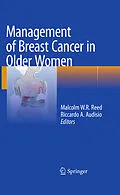Management of Breast Cancer in Older Women offers the reader evidence-based clinical knowledge of older patients suffering from breast cancer. It presents the most up-to-date research and clinical knowledge from the leading specialists across a range of fields that come into contact with older breast cancer patients.
Multidisciplinary in its approach, this book covers all the bases for managing breast cancer in older women. The full armament of therapeutic options is presented, as well as the epidemiology of the disease in older women and the specific psychosocial considerations for older patients.
Medical oncologists, gerontologists and all involved in the management of older breast cancer patients will benefit from having this unique and important work on their shelf.
Malcolm W Reed, MD, MB ChB, BMedSci, FRCS is Professor of Surgical Oncology based at the University of Sheffield and Sheffield Teaching Hospitals NHS Trust in Sheffield, UK. His extensive research history includes work on hormone receptors in breast cancer and the effect of photodynamic therapy on the tumor microcirculation.
Riccardo A Audsio, MD, FRCS is Consultant Surgical Oncologist at St Helens and Knowsley University Hospitals, St Helens, UK. His main research interest is exploring the role of surgery within the multidisciplinary management of cancer patients, particularly focusing on onco-geriatrics, and he currently sits on the editorial board of 12 publications.
Zusammenfassung
I was looking at Mrs T all 45 kilos of her with somewhat puzzled thoughts. I had prescribed her capecitabine at very prudent doses, in view of her 91-year-old kidneys and physiology. She had reduced my treatment even further, because it was making her tired. As a result, she was taking a grand total of 500 mg of capecitabine a day. Yet, her metastatic, ER/PR-negative, Her2-positive breast cancer was undoubtedly responding. Her pain was improving and her chest mass was shrinking, as were her lung metastases What was the secret of that response? Were Mrs T's kidneys eli- nating even less drug than predicted by her creatinine clearance? Was her sarcopenia altering drug distribution? Was she absorbing more drug than average? Or was her tumor exquisitely sensitive to fluoropyrimidines? Physicians, said Voltaire, pour drugs they know little for diseases they know even less into patients they know no- ing about. Medicine has made tremendous progress since the eighteenth century. Yet, there are fields where quite a lot remains to be learned. In developed countries, 25% of breast cancers occur in patients aged 75 years and older. Yet, these patients represent only 4% of the population of traditional clinical trials. That ought to let us wonder how relevant data acquired in patients in their 60s are to a nonagenarian. Fortunately, geriatric oncologists have been stepping up to the task and have gen- ated data to help us to treat such patients.
Inhalt
Background and Epidemiology.- Basic Science of Breast Cancer in Older Patients.- Tumor Biology and Pathology.- Clinical Epidemiology and the Impact of Co-Morbidity on Survival.- Special Considerations in the Management of Older Women.- Comprehensive Geriatric Assessment.- A Practical Mini-Guide to Comprehensive Geriatric Assessment.- Impact of the Physiological Effects of Aging on the Pharmacokinetics and Pharmacodynamics of Systemic Breast Cancer Treatment.- Impact of Hormone Replacement Therapy on Breast Cancer.- Experiences of a Multidisciplinary Elderly Breast Cancer Clinic: Using the Right Specialists, in the Same Place, with Time.- Therapeutics.- Mammographic Breast Screening in Elderly Women.- Primary Endocrine Therapy for the Treatment of Early Breast Cancer in Older Women.- Peroperative Radiotherapy.- General and Local Anesthetics.- The Surgical Management of Breast Cancer in Elderly Women.- Breast Reconstruction.- Adjuvant Endocrine Therapy.- Adjuvant Chemotherapy.- Adjuvant Radiotherapy.- Prevention and Treatment of Skeletal Complications.- Medical Management of Advanced Disease.- The Use of Chemotherapy in Elderly Cancer Patients: Dose Adjusting, Drug Interactions, and Polypharmacy.- Psychosocial Considerations.- Delayed Presentation of Breast Cancer in Older Women.- Patient Decision Making.- Culture, Ethnicity, and Race: Persistent Disparities in Older Women with Breast Cancer.- Supportive, Palliative and End-of-Life Care for Older Breast Cancer Patients.
